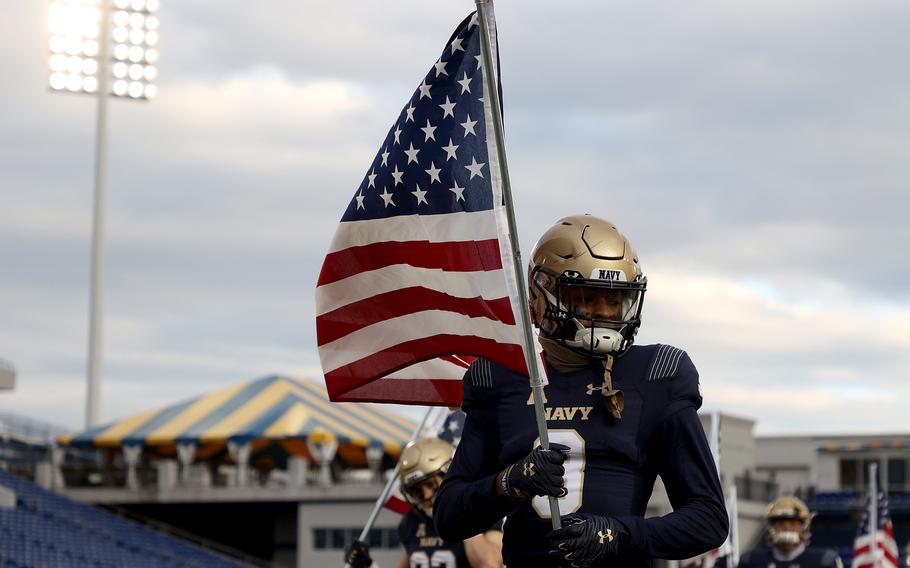
Navy's Cameron Kinley carries a U.S. flag as the team takes the field against Tulsa at Navy-Marine Corps Memorial Stadium on December 5, 2020, in Annapolis, Maryland. (Rob Carr, Getty Images/TNS)
(Tribune News Service) — Cameron Kinley is a 6-foot-2, 205-pound cornerback who performed quite well at the Tampa Bay Buccaneers rookie minicamp as an undrafted free agent last month.
Kinley is a recent graduate of the United States Naval Academy, and following that impressive debut that included an interception of Kyle Trask he was supposed to report to the Bucs’ full-squad minicamp Tuesday.
But on Monday he said he has been told there will be no more NFL for him, at least for now.
No, he wasn’t cut. The acting Secretary of the Navy, Thomas W. Harker, declined Kinsley’s request for a delay to the start of his military career as an ensign in information warfare.
The easy take here is to shrug your shoulders and say, “Hey, if he wanted to play in the NFL, he should have gone to a college without a military commitment. He knew what he was signing up for.”
But recent precedent is for requests like Kinley’s to be approved.
Kinley was not highly recruited by Division I schools for football coming out of high school. At Annapolis, he thrived as a midshipman and blossomed as a football player, according to his coach, Ken Niumatalolo, the former Radford High star and University of Hawaii quarterback and assistant.
“He’s everything great about our country. He epitomizes what our program is all about, “ Niumatalolo told the Tampa Bay Times in a May 11 article. “He’s one of the best captains we’ve had on the field. He’s been a good defensive back for us, because of his length and speed and physicality. He played a lot of corner for us and can play a lot of different positions. He’s just a player that did everything for us.”
Niumatalolo also addressed the off-field leadership of Kinley, who was president of his class.
“It was tough last year, “ Niumatalolo said. “Take out the football, it was a tough year. I thought he did as good a job as a captain as anyone we’ve ever had. He did a great job inspiring our guys.”
Niumatalolo could say very similar things about many of the young men he has coached at Navy—including Joe Cardona, Malcolm Perry and Keenan Reynolds. Those three recent Navy graduates were allowed to play in the NFL immediately.
Permission for active duty delays for academy graduates with potential NFL careers have become routine in recent years.
Air Force Academy graduates Nolan Laufenberg, Parker Ferguson and George Silvanic and West Point’s Jon Rhattigan have been allowed to participate in NFL minicamps this year.
Military members learn quickly that strict adherence to tradition and uniformity is demanded in many matters. But policies and orders constantly change, too. This academy-pro sports issue has always seemed to be case-by-case.
Roger Staubach started his Hall of Fame career as Cowboys quarterback in 1969, four years after his graduation from Annapolis and serving as a Navy officer. Other notable athletes who served and then played in the NFL include Phil McConkey and Alejandro Villanueva (both Army ). Navy’s Napoleon McCallum played and served concurrently for a year after graduation, and then returned to the NFL after three more years in the Navy.
Basketball player David Robinson graduated from Annapolis and served two years of active duty before starting his Hall of Fame career.
It’s impossible to know if Kinley can make an NFL team after his military commitment is completed. The window doesn’t remain open for new cornerbacks as long as it does for most other positions.
Although he and his agent both made strong statements calling the rejection of his request unfair, Kinley was also philosophical on social media.
“Sometimes you can do everything the right way and still not end up where you want to be at the end of the day, “ he tweeted.
Positive public relations and a boost for recruiting are among the points made for allowing academy graduates to wear NFL instead of military uniforms.
That’s great, but more effective messaging will result if the armed forces come up with a consistent policy.
Also, while military life isn’t always fair, unless there’s a severe shortage of information warfare junior officers in the Navy there’s no reason Cameron Kinley shouldn’t get the same chance his athletic peers from the academies have been granted.
(c)2021 The Honolulu Star-Advertiser
Visit The Honolulu Star-Advertiser at www.staradvertiser.com
Distributed by Tribune Content Agency, LLC.